Peru's gold rush pits illegal miners against government
- Published
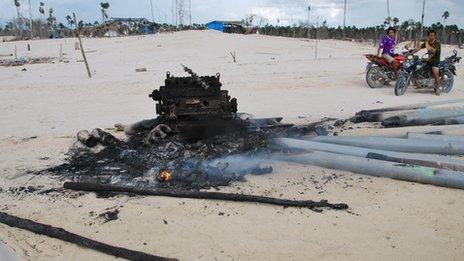
Mining pumps like these have been destroyed by the Peruvian police
Tens of thousands of Peruvians have flocked to the country's Amazon region to join a chaotic gold rush. But illegal mining has led to violence, pollution and the destruction of parts of the country's precious rainforest. Can new government measures to control the miners succeed?
Manuel Kameno reaches into the undergrowth and plucks out a bright green leaf. "This one is good for back pain," he says.
A bit further on, he swoops down again and picks a stem with a fragile yellow flower on top.
"For toothache," he says, and marches further into the forest.
Mr Kameno, who is well into his seventies, is a walking encyclopedia of the amazing variety of plants and animals in the Peruvian Amazon, one of the most bio-diverse rainforests in the world.
But all this is changing before his eyes.
Peru's south-eastern Madre de Dios region is in the grip of a frantic and lawless gold rush.
Record prices on international gold markets have attracted tens of thousands of migrants from across Peru, overwhelming the existing informal mining sector.
Illegal miners now operate right on the border of Kameno's indigenous community, the Amarakaeri.
"Since mining started with machines, the gold miners have made holes in the forest. So the animals have run and gone to other places. Our fear is that the forest will disappear," Mr Kameno says.
Further up the mighty Madre de Dios river, the reason for his concern becomes clear.
Huepetuhe is one of oldest mining areas in the region. It looks as though the skin of the earth has been peeled back. Earth-movers pick unceasingly at the carcass.
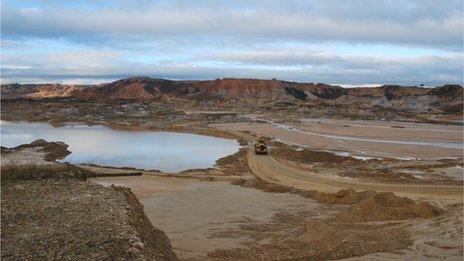
Gold mining has stripped trees from parts of the rainforest
Walter Baca takes me on a tour of his goldmine. Clad in a pair of shorts and Wellington boots, he proudly shows me how it all works. Truckloads of earth are dumped down a steep metal chute and mixed with water. At the bottom, muddy fluid spews out over mats designed to catch particles of gold dust.
By the end of a 10-hour shift, Mr Baca and his team of a dozen miners have collected about 40g of gold.
"In the last few years, there has been gold fever here because back in 1999 gold was worth just 27 soles a gram. Last year, there were days when it was worth 145 soles (about $55)," he says.
People continue to arrive from Peru's poverty-stricken highlands to seek their fortune.
The government believes that anywhere up to 50,000 small-scale miners are now active in the Madre de Dios region.
Almost all operate outside the law, without government permits and with little concern for the environment.
Deforestation is not the only problem.
Miners use mercury to process the gold dust, which then pollutes the rivers and the food chain.
The president of Madre de Dios regional government, Jose Luis Aguirre, is frank about the scale of the problem: "It's almost like it has kidnapped us in our own homes. I have had death threats myself from illegal miners."
But the administration of President Ollanta Humala, elected last year, is now acting, he says. New decrees issued in February set out tougher penalties for illegal mining.
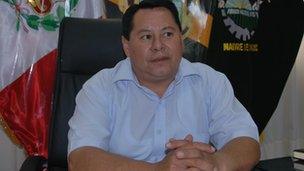
Regional politician Jose Luis Aguirre blames illegal miners for violence in the Madre de Dios region
"The police have been using dynamite to blow up the mining pumps because that is the only way of making sure they are completely destroyed," says Mr Aguirre.
The government is aiming to clear all illegal miners from areas bordering the national parks, and several thousands have so far been removed.
People operating in areas where mining is not prohibited can continue as long as they legalise their activities by getting proper title to land, obeying environmental regulations and paying tax.
But that has provoked a fierce dispute between the miners and the government.
Corruption
Some miners say that, in practice, government corruption and bureaucracy make it impossible to legalise their work.
"I handed in my environmental assessment to the Mining Ministry four years ago and it's still sitting there. They still haven't even evaluated it," says Mr Baca.
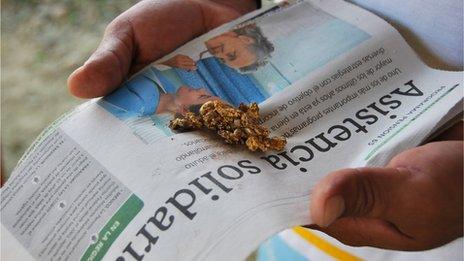
High international gold prices have fuelled the gold rush in the Amazon
Mr Aguirre accepts that corruption is a serious problem.
"The weight of gold buys many consciences. I know there are people involved in corruption, here in the regional government. We have found that there are public prosecutors who even own their own mining dredges."
Mr Aguirre says he cannot sack these officials because they are employed by the national rather than the regional government.
In the past, corruption and government incompetence have scuppered efforts to control illegal mining in Madre de Dios.
But the central government, indicating a determination to act, has sent more staff to bolster the regional mining ministry.
It has given miners until March next year to either start operating legally or stop mining.
But there is strong resistance. Thousands of miners took to the streets of the regional capital, Puerto Maldonado, in March to oppose the government's reforms. Three were killed in clashes with police.
'Coffins and body bags'
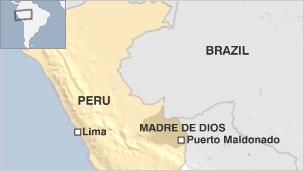
More confrontation appears to be looming. Luis Otsuka, the head of Fedemin, the local miners federation, is adamant that his members will not accept the government's reforms.
"I am telling the central government to bring coffins and body bags here because they won't just be taking dead miners away, they'll also be taking police and their soldiers. We will never let them steal our work from us."
Mining is a sensitive issue for President Humala, who was elected on the promise of ensuring poor Peruvians got a fairer share of the country's natural resources.
But Fedemin accuses the government of targeting small-scale miners while doing business with foreign mining corporations that have multi-billion dollar operations in other parts of the country.
The government in turn argues that powerful miners' leaders oppose reform simply because they stand to lose huge revenues if they are forced to become registered, taxed and regulated.
The outcome of this stand off will depend partly on whether President Humala - unlike his predecessors - sustains his crackdown in the face of likely future protests.
But it will also depend on events further away.
The rate of increase in illegal gold mining has been determined largely by the global gold price. That, more than anything, may dictate the speed with which the forest is cut down to make way for gold mines.
<italic>You can listen to Rob Walker's report from the Peruvian Amazon on </italic> <link> <caption>Assignment </caption> <url href="http://www.bbc.co.uk/programmes/p002vsn0" platform="highweb"/> </link> <italic>on the </italic> <link> <caption>BBC World Service. </caption> <url href="http://www.bbc.co.uk/worldservice/" platform="highweb"/> </link> <italic>The documentary will be broadcast from Thursday 12 July 2012 </italic>
- Published4 July 2012
- Published14 June 2012
- Published2 June 2012